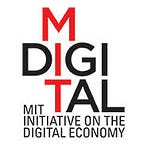Digital Leadership on the Fly
How to lead when business transformation is no longer optional
By Paula Klein
Autonomy, speed, openness, and impact are key factors to creating a digital organization. Sure, it’s easier if you’re at a “born-digital” enterprise, but traditional businesses can — and must — adopt these values, as well. That was one takeaway message MIT IDE Principal Research Scientist, George Westerman, offered attendees at the May 23, MIT CIO Symposium.
Leading a discussion on Creating a Digital Culture, Westerman prodded panelists for examples of how executives can actually achieve the elusive goal of organizational change in the face of rapid-fire digital technology advancements. Andrei Oprisan, VP of Technology at Liberty Mutual, and Director of the Boston Tech Hub, underscored the importance of getting it right: “Everything is on the table. We’re seeing Amazon and Google getting into our space; we know we can build products faster and better, but we must unlock talent and shorten time spans,” to stay competitive. In short, “we have to reinvent ourselves,” he said.
Cultural changes can be small — like loosening the dress code — or large, such as embracing tech hubs and “trusting employees to solve problems and then getting out of the way.” Most of all, Oprisan said to “be open to failure and evolve quickly.”
Removing Roadblocks
Many executives agree with Melissa Swift, Global Leader for Digital Solutions, Korn Ferry Hay Group, that “old ways don’t work anymore.” But they have trouble figuring out what to do next. She suggested that the goal isn’t “just to create some warm, fuzzy environment, but to remove stones from the road and change your requirements for digital talent.” Multiple cultures and subcultures can flourish simultaneously, she added, experiment and see what works.
At Liberty Mutual, Oprisan takes his mandate for change seriously. Anyone interested can apply for training to become an engineer — at the company’s expense. “We will pay for them regardless of background.” So far, lawyers, administrators and others have signed on to learn new digital skills and build the business’ digital capabilities at the same time. It also adds fresh perspectives. (Watch the video of this panel here.)
What is Your Competitive Advantage?
The theme of digital culture was amplified by others during the day’s event. In the title of his new book, Peter Weill, Chairman of the MIT Sloan Center for Information Systems Research, asks: What is Your Digital Business Model? At the Symposium he offered a framework for making old businesses — and their leaders — relevant in the digital era. It’s a major concern considering that about half of a company’s leaders turn over as it transforms to digital, Weill said. Among the questions to address and recognize: What are the threats and opportunities? What is your competitive advantage, and what muscles do you need to develop or acquire? Finally, do you have the leadership to pull this off?
Later in the day, Westerman spoke with CIO leaders for their tips and advice. Harmeen Mehta, Global CIO and Head of Digital at Bharti Airtel, takes a firm stance as a technology evangelist: Most CEOs “are old school and don’t know too much about technology or innovation. CIOs have to pitch ideas and be assertive,” she said. As IT leader of India’s largest telecom operator, Mehta’s approach has led her to many successes including winning the CIO Leadership Award at this year’s Symposium.
Mehta is responsible for all of IT and engineering across India, South Asia, and 14 countries in Africa. She also leads the digitization agenda across Bharti Airtel, building platforms to bring new monetization opportunities to the company. With more than 350 million customers, Airtel runs a huge big data platform and greatly leverages machine learning and AI to power these platforms.
Although culture is important, Mehta relies on her “technology edge” to drive change. “Your expertise is key,” she said, warning CIOs not to become generalists. Specialization and depth of knowledge will set you apart in these tumultuous times, she said.
